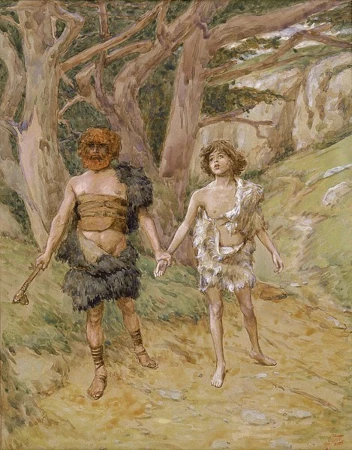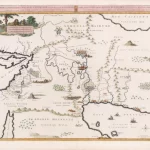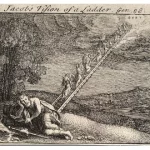I took up the subject of Cain and Abel a few weeks ago, in the context of Cain killing Abel and his subsequent wanderings, crossing the ocean to a new land in South America, and building a city named after his son Enoch.
In today’s post, I decided to direct my hypothetical considerations to the source of these two brothers born of the first human couple – Adam and Eve.
Is the Bible really the original source of this story? Or maybe the story of Cain and Abel was borrowed by biblical scholars from much older stories and accounts?
Genesis 4:1-4
1 And Adam knew Eve his wife; who conceived and brought forth Cain, saying: I have gotten a man through God.
2 And again she brought forth his brother Abel. And Abel was a shepherd, and Cain a husbandman.
3 And it came to pass after many days, that Cain offered, of the fruits of the earth, gifts to the Lord.
4 Abel also offered of the firstlings of his flock, and of their fat: and the Lord had respect to Abel, and to his offerings.
As we well know, the Lord’s favoritism towards Abel led to the first murder and fratricide in the history of mankind, according to the Bible.
If we admit that the Bible is an interpretation of much older Babylonian, Assyrian and Sumerian accounts, the matter takes on a slightly different format.
According to Sumerian accounts, Enlil created the first farmer named Anshan, giving him a plow, and the first shepherd named Lahar, for whom Enlil set up a sheepfold.
A conflict arose between Anshan and Lahar, the content of which was the superiority of the work performed and the crops delivered. Enlil and his brother Enki (EA) resolved the dispute in favor of the farmer.
Another interesting Sumerian account is the ancient text about two brothers “The Dispute Between Enash and Enten”. Enash was a shepherd, and Entan was a farmer, which caused a conflict over the superiority of agricultural and animal products provided to the Gods. In this case, Enlil decided in favor of the farmer, arguing that without grain and plants, without irrigation of the fields, nothing would grow and nothing would be fed, including the livestock.
In both Sumerian stories, there was no fratricide, brother did not murder brother, because the dispute was resolved by the Gods.
On the other hand, the dispute between human brothers may have a much older basis, and its beginnings in the dispute between the brothers Enlil and Enki over domination of Earth. One of the brothers was the firstborn (Enki), but born of a woman from a different family, the other of the brothers, the younger (Enlil) was born of a woman from a close family of Anu, which gave him priority in inheritance. This is a common, contemporary Jewish tradition, giving inheritance to a son born of the father’s sister (or half-sister). Royal families throughout Europe have also for centuries preferred to marry members of other royal or princely families.
Furthermore, the story of Cain and Abel may have been embellished, showing the Bible readers the effects of envy and pride, which led to further, unwanted consequences.
To sum up the above considerations, it can be assumed that in fact Cain did not kill Abel, but the Bible authors borrowed earlier Sumerian stories, transforming them according to their own interpretation, also removing the Sumerian Gods from them, replacing them with their own.
Considering that the Gods did not exist, but were merely a misinterpretation of extraterrestrial beings from another, more technologically advanced planet, described by primitive people, the big question is:
Did representatives of an extraterrestrial, technologically advanced civilization influence the development of Homo sapiens in the remote past, helping them by teaching them various areas of life and providing tools or a way to produce them?
As usual, I leave the answer to this question to each individual.





